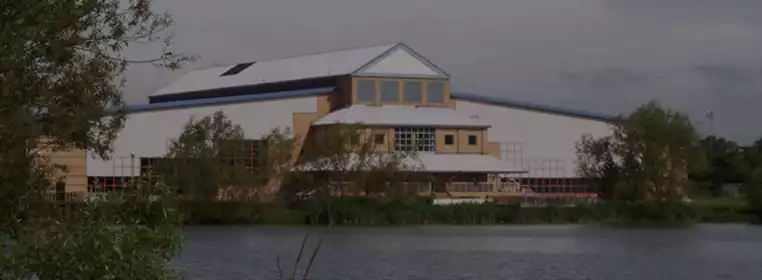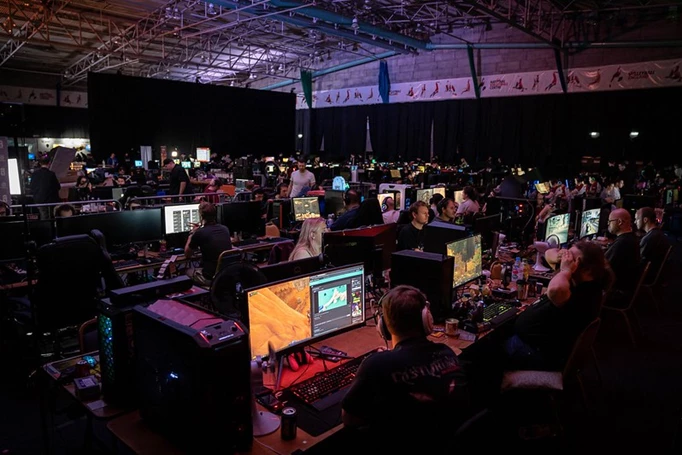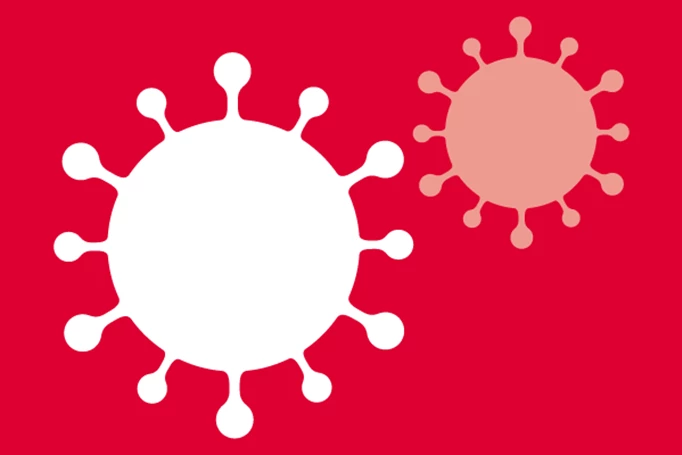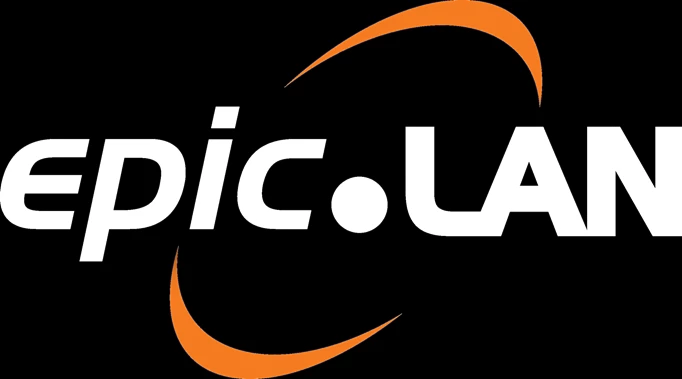Information Gump: One Person's Growth From A Boy To A LAN

Quotations are not verbatim and have been edited by GGRecon for brevity and clarity.
On a pleasant Sunday morning, a week after the successful conclusion of Epic.31, GGRecon sat down for a chat with Tom "Gumpster" Gumbleton, the League Ops Manager at Epic.LAN. With years of experience in the UK LAN industry, and being part of the successful transition of Epic.LAN to Epic.WAN in response to the restrictions imposed by COVID-19, Gumpster's insight and commentary on current affairs could well mark out a route for other LAN events to follow, and survive.
How did your journey in community events and esports events begin?
Basically, I started gaming back at the end of 2003 with some best friends at school. At the time, we were enjoying Counter-Strike 1.6 (CSS). Once we’d sort of gotten together and played together as a clan, as part of the 5th Battalion – a Medal of Honour clan, we went to a turn up and play event at Excel in London. We participated there, and I saw events from a different perspective. Not just exhibition events, but also as tournaments, and I saw the interactivity of games and people in a new light. From there, I went to StratLAN Christmas in 2006, which opened my eyes to more community events than just exhibitions. We eventually went to Iseries (I.30 – 2007), watching the Iseries tournament with the German organisation ITW and Ultimate Attacks. So again, I got to see another side of community eventing.
I got involved by accident with I.33. CSS was very poorly run, to the extent that the head admin walked out (34 teams into a 32-team bracket after 64 groups of three teams). I stepped up and ended up running the biggest ever losers tournament (£5 per player) that raised £1500 for the lower bracket. It was so successfully ran that I was brought on for I.34, where I reshaped the way brackets were done there, and for tiered tournaments too. Eventually, I went on and retired from adminning at I.46, moving from CSS to Counter-Strike: Global Offensive (CS:GO) and I got an e-mail from Mr Winkle at Epic.Lan who needed ‘someone to run our CS:GO – would you be interested?’
I said yes, intending for it to be a swansong for my efforts in the LAN scene.
As it turned out, I would be involved for the next eight years or so.
What does Epic.LAN mean to you?
Epic.Lan means to me, a second family. A family to me.
We have, within every level of Epic.Lan, our disagreements, our spats, but then we also have our happy times. Regardless of everything, we are a group of people who are building something that we can all ultimately be proud of. We’ve been on this journey together. Obviously, I’ve had my doubts, but it always comes down to the fact that I really, really care. This is my hard graft and labour, that I put in because I love it. We all dream of making Epic.Lan bigger and bigger, but the unifying reason we all do this is because of our community.

 Click to enlarge
Click to enlargeIn your own words, and from your perspective, could we get an abbreviated history of Epic.Lan, with that behind-the-scenes perspective?
Epic.Lan has technically been going on for a long, long time now. It was originally called CLUK (Central LAN UK). TNWA (Who owned Enemy Down) bought CLUK and wanted to run events using that same team. There was a little bit of disgruntlement, so they left and created what is now called Epic.LAN, which has been going since 2008/9.
Epic.1 was in a small village hall near Stoke – which grew up and migrated over to Uttoxeter racecourse by Epic.5 and integrated our first esports titles. At first, we had CS:GO and Team Fortress 2, which then expanded to include Call of Duty 4 as we leaned further into esports. By Epic.10 they outgrew Uttoxeter, and went on to Kettering Conference Centre (KCC) so that the utilities of the venue were able to allow us to grow. The internet at Uttoxeter was quite poor. At KCC we actually had to hire out a satellite to provide capacity for the games and other internet activities we had on offer. We had gone from 250 players to 300 players, and the internet capacity needed to grow in tandem. People wanted to watch Twitch, TV, Youtube and other broadcasts, and so the internet capacity of the venue had to grow, and also so did the needs of games so as such, the capacity had to grow too. At Epic.10 we had the games of the day; DOTA 2, CS:GO, and CoD. With Epic.11, we also brought on League of Legends (LoL) and Starcraft 2 (SC2). There were certainly a lot of issues that had to be overcome for the event to grow further. At the time, we still roughly had a 300 person capacity, with esports not being the main draw at all.
Around the time of Epic.17 – we spiked up from 300 to 400 participants, and we sold out on Christmas Eve that year. Our internet was more managed and better, due to our technical manager managing to use the five different lines going out of KCC, but it wasn’t really until Epic.21 that we brought in the new gigabit capacity on the internet. After talking to KCC and negotiating about their internet capacity, we came to an agreement regarding the gigabit line, which massively boosted the capacity. With the internet no longer being an issue, we moved into the arena at KCC for Epic.26. The plans from an Epic.LAN perspective regarding growth, there was a stage-by-stage process for what areas of KCC we would take up as we grew. We went from upstairs-only, expanded downstairs into the Lakeside suites and then at Epic.26 we expanded to the main arena and moved completely downstairs. From there, we were going to increase our arena capacity and then also move upstairs, with the arena set up for esports and the other areas set up for our casual and community events. We would eventually get to a stage where we needed the entire venue, including the theatre (which would be the logical spot for our stage content). Our aim would be to eventually expand to a 1500-person capacity.
What motivated you to become an integral part of the UK LAN Scene?
The thing that motivated me the most was seeing everyone else doing competitions in a way that don’t suit the players. At I-series, you would pay £100 to go to LAN, play three games and maybe get a bracket game. For me, that was not value for money from either a player or community perspective. More games equalled more value, and more capacity for people to go to a LAN and enjoy themselves. The stress of playing a game can take its toll, but because people get so many games, it makes it so much more worth it—my core beliefs with Epic.Lan tournaments are that we have that value for money aspect. By having this core belief and propagating it via Epic.Lan, I’ve been able to have that kind of belief proliferate throughout the rest of the UK LAN scene.
We’re always looking for ways to make the balance between gametime and the like the best that we can, and I think the way in which we have done this has had a knock-on effect throughout other LAN events.
Obviously, Epic.Lan is, as we have mentioned, an integral part of the UK LAN Scene – it brings together highly skilled admins, production staff, community casters and content creators across the UK for a celebration of gaming and esports. It’d be remiss of us not to address the elephant in the room.
COVID-19 has presented a huge challenge to the events industry worldwide, which understates the reality of the situation hugely. How has the shift from Epic.LAN to Epic.WAN affected the way in which you conduct this celebration of the industry?
Moving to Epic.WAN was very difficult. Let's be honest, we held an event in February at KCC, we were very lucky about the timing and very lucky not to have any COVID-related instances back then actually affect the event. When lockdown hit in March, there was a serious worry as to how it would affect the event. We were still very much hopeful at that time that a July event would be possible, but it became apparent in May and June that we would have to cancel the event and do something different.
The talks that we had were very fruitful. Some of us believed that we should still conduct an event, given the industry that we work in. They believed that we could shift the esports events online. The game that we mostly worried about was our CS:GO competition, moving from LAN to WAN. We knew that we could run the esports titles. But without pingless LAN connectivity, the CS:GO in particular would not have the same competitive integrity, some thought. Honesty is the best policy, I felt that an online event would be pointless to some degree. I didn’t feel like an online event was something we could sell to people. I felt that we weren’t going to get the same engagement, with the amount of tournaments going around that offer prize pools for free. Fortunately, I was proven wrong, spectacularly.
Our SC2 community mostly paid extra. We had a flat rate of £15 per ticket, but then we had an optional top-up of the ticket. People could realistically top up the ticket as much as they wanted. In the wake of lockdown and the decision to move to a WAN event, ticketholders were contacted if they wanted their tickets moved across to another event or refunded, but a lot of the community decided that they wanted to just transfer the tickets. It says a lot, that they knew that whilst this might be a temporary problem, they wanted us at Epic.Lan to come through the other side. They wanted us to be there after the pandemic.
After July’s event (Epic.30) I was still incredibly enthused. It was still fun, a bit wacky, a bit like Epic.LAN but very much still something to be proud of. Obviously, there were issues, but the general gist of it was a lot of people really enjoyed the event! We had 31 teams for CSGO, 40 for SC2, it was wonderful. This prompted us to think about what would happen going forwards, and so we decided that the online portion of the organisation was something that we wanted to carry on. We considered a hybrid event, in the Fairisle room at KCC (120 in a 240 capacity, socially distanced) with them working with us to provide a COVID safe environment. Unfortunately, that was scuppered when the Government released further guidelines on exhibition centres, which required face coverings to be worn at all times. This popped a spanner in the works since Winkle had put so much time into researching regulations, negotiating with KCC, going to all kinds of lengths to try and set up a hybrid version of the event, and then the COVID updated guidelines put paid to that.
We all thought that people wouldn’t want to go to an event where you have to wear a mask all day, and so we put up a poll on the Facebook group which was hugely 50/50. We needed 120 people to make it financially viable, and if we weren’t going to be able to confirm that then it would not be worth it.
COVID has had a huge impact on how we run events. The scary thought is that depending on how the pandemic plays out, we may never return to how it was. No-one may ever again think that a LAN in the way we ran it is viable due to social distancing and that. We really haven’t gotten to the stage where we’re considering these things any more, we’re just looking at our next event and looking at how best to provide a WAN in future.
Another thing to consider is localised lockdowns, there is the possibility that for instance, KCC would be locked down. There are so many factors which are going into how we move forward and survive that we are now working event by event.

 Click to enlarge
Click to enlargeWhilst COVID has negatively affected the growth of many industries, esports seems to have actually prospered, as an entertainment medium and as an industry in the context of a global pandemic. In your opinion, are esports destined to continue growing during these further lockdowns, or is there a plateau at which this growth will stop?
So I’d say that it’s very difficult to anticipate. The longer this goes on, the more likely that growth will continue. As people grow bored of their usual mediums, they may well pick up gaming and then by extension esports. Streaming is becoming more mainstream. People like David Hewlett, Rabbie Lamill, James Buckley – F1 drivers have also started streaming on Twitch like Lando Norris. It's one of those mediums where I think you will see mainstream celebrities moving onto Twitch, which will bring people from other backgrounds onto Twitch, from which there could be a leak from those channels to esports.
The counter is that people will get bored with gaming and being inside, and will start heading outside and enjoying other things. Are people bored of lockdown and going out more, trying to get back to normal or are people going to keep going? Epic.31 grew from Epic.WAN. Rainbow Six: Siege (R6:S) happened with 14 teams signed up. SC2 was lower, but due to other larger competitions going on at the time as well as a number of real-life issues. Twenty-six teams meant that the situation was the same with CS:GO. Valorant however, we ended up getting 36 teams, having to increase the cap from 32 to 40 to ensure the bracket wasn’t overfilled. Epic.30 titles were slightly down, but other titles and industry shifts gave us numbers elsewhere which meant that despite shifts in trending esports titles, we were able to put across a variety of strong, very good tournaments.
There is certainly the capacity to go forwards and for esports to keep growing. Esports and gaming viewers on twitch and youtube are growing, which is great! The more viewers and that will lead to bigger and better events. Moving into a post-pandemic landscape, it will be nice to see Epic.LAN take this growth in stride, and I genuinely think that our first LAN after the pandemic will be the biggest and best we’ve ever done, with those who wanted to go to LANs satiated, and hopefully newcomers to the Esports and Gaming event community.
Events like this bring people together from all areas of life. Everyone that has an interest in gaming, and you want to be a part of that. That’s the beauty of it all. I live for LAN events. I want to be part of those events, and I want to be seeing my third family, the people I care about. It's everything we want to be moving towards. Whether things plateau, I don’t know. The release of the next generation of consoles will, I think, prompt yet another spike in streaming and another set of people to be involved in gaming, with Twitch being the frontrunner of gaming moving forwards, with hopefully thousands upon thousands moving into the industry.
It's difficult to judge, but I suppose another aspect of that is that gaming is possibly a form of escapism, which is something people will need if the world continues as it is right now, with pandemics, spikes and all other things like that.

 Click to enlarge
Click to enlargeWhilst COVID has interrupted and damaged the majority of the UK events industry, Gumpster's testimony on the way that Epic.Lan survived is one that could perhaps shine a light, a beacon of hope for those who seek to see such happy times at LAN events once more. Yes, the industry seems to be moving towards online delivery, which runs contrary to the concept of a LAN event. However, the fact that there is still interest and proactive preparation for events from such organisations shows that there is hope that one day we may well have these live, in-person celebrations of gaming once more.
Images via Epic.Lan | health.org.uk | ketteringconference.co.uk